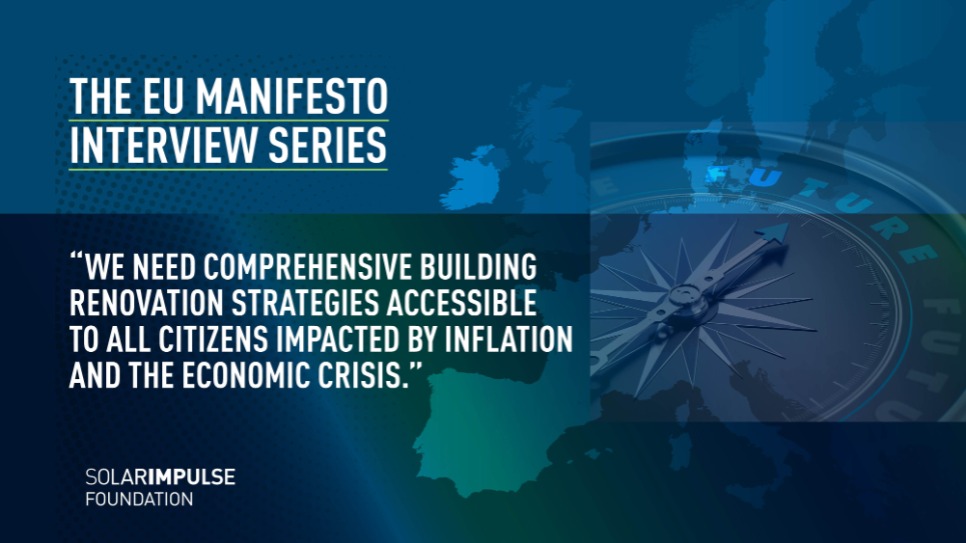News - April 25, 2024
"The EU's 2040 strategy needs clear and ambitious measures to speed up the decarbonisation of heating & cooling"


Written by Alessandro Gaillard 3 min read
The EU Manifesto Interviews
In March, the Solar Impulse Foundation published its E.U Manifesto : Modernise to Thrive. The Manifesto, counting with the contribution of more than 40 stakeholders, is grounded in the steadfast belief that an efficient and resolute implementation of the Green Deal can and will come with multiple collateral benefits. Three of these stakeholders are EuroHeat & Power, European Heat Pump Association and Adrian Joyce from EuroACE. We had a chat with them to discuss the transition of the Heating & Cooling (H&C) sector and what's next for the industry.
Solar Impulse (SIF) : H&C, representing half of our energy consumption, is the elephant in the room when it comes to decarbonisation of our energy system. Why is it so difficult for Member States to decarbonise this sector? And why do we need to do so to be on track by 2040?
EuroHeat & Power: Heating and cooling demands, which heavily rely on fossil fuels, represent 80% of buildings' energy consumption and 60% of industries' total energy needs. This reliance is the hidden driver behind the soaring energy prices that have weighed on households and EU businesses over the last two years. The EU's 2040 strategy needs clear and ambitious measures to speed up the decarbonisation of this sector, critical for achieving a two-fold benefit: reducing CO2 emissions and shielding EU citizens from energy price volatility.
European Heat Pump Association (EHPA) : It is critical to achieve the decarbonisation of the H&C. In the residential sector, around 80% of the final energy consumption is used for space and water heating. It seems difficult for Member States to decarbonise this sector especially now in the run-up to elections because everyone has a heating system in their house, so you enter people's houses directly. It is therefore very important to debunk myths and stress the many long-term benefits of heating decarbonisation not only for society as a whole but especially for individual citizens such as better air quality, lower energy cost, less dependency on fluctuating gas prices, one system can provide heating and cooling at the same time.
Adrian Joyce (Euro ACE) : The reason that we have to decarbonise heating and cooling is that the bulk of the energy used for these purposes is still fossil fuels, as said above! But of the two, its heating that is the most urgent to tackle. This is because only about 5% (or less) of the energy used in buildings goes to cooling, even if this portion is fast growing. An overlooked tool for tackling the heating needs in buildings is the ambitious energy renovation of our building stock. What I mean is that if we reduce the energy demand for heating by reducing the losses through the fabric of buildings we eliminate the need for heating (or at least a huge part of it) and thus the need to use fossil fuels.
The role of local authorities will be key in decarbonising the H&C sector, how could/should we empower them so they can drive the decarbonisation of this decentralised sector?
EHPA : Local authorities are important to create awareness, to help citizens in making the right choice by giving advice and to take away the administrative burden. A very good example of this is via one stop shops such as the Electric Ireland Superhomes.
EuroHeat & Power : Local authorities will be key players in this transition. Larger municipalities above 45.000 inhabitants will now be required to develop heating and cooling plans. This should help accelerate the rollout of clean heat solutions such as district heating and tap into local sustainable heating and cooling sources. To effectively design and implement these plans, local authorities will require adequate human and financial resources.
The H&C sector is also a sector where efficiency gains can be important. How should we couple efficiency and decarbonisation to maximise benefits ?
EHPA : Energy efficiency and decarbonisation or renewable energy should not be seen as separate silo's anymore but should reinforce each other. A key example of that is the revised energy efficiency directive in which efficiency gains from one fossil fuel combustion technologies cannot be taken into account anymore towards energy savings. This approach should always be used and heat pumps are the perfect example of this. Not only are they 3 to 5 times more efficient than a fossil fuel boiler, they also use renewable energy (from air, ground, water or waste heat) and if the driving electricity is 100% green, you have a 100% green heating solution.
Finally, what are you expecting from the new EU institutions? What should come next in terms of EU policy?
EuroHeat & Power : A robust framework beyond 2030 is essential to accelerate the decarbonisation of heating and cooling. Targeted financial instruments are needed to de-risk and facilitate investment in renewable and recovered heat projects across residential, commercial, and industrial sectors. Ensuring a fair and affordable transition is crucial: we need comprehensive building renovation strategies and fossil fuel heating replacements accessible to all citizens impacted by inflation and the economic crisis.
Adrian, EuroAce : Our main expectation from the EU Institutions is that they will oversee the complete, rapid and accurate implementation of legislation adopted under the current Commission (the Fit-for-55 Package).
EHPA : The 5 points that should be addressed in the next legislative period are described in our manifesto and can be summarised as follows: 1) set clear policy direction and targets by publishing the heat pump action plan and properly implement the FF55 package 2) make heat pumps affordable for all by among others reducing the difference between the electricity and gas bill 3) strengthen industrial leadership and skills by clearly including heat pumps in the clean transition dialogues and strengthening the competitiveness of the whole European heat pump value chain 4) unlock the full potential of large heat pumps by among others regulating industrial heat up to 200°C and waste heat recovery 5) use heat pumps' flexibility to support the energy system by valorising the flexibility from heat pumps and taking it into account in grid planning.

Written by Alessandro Gaillard on April 25, 2024
